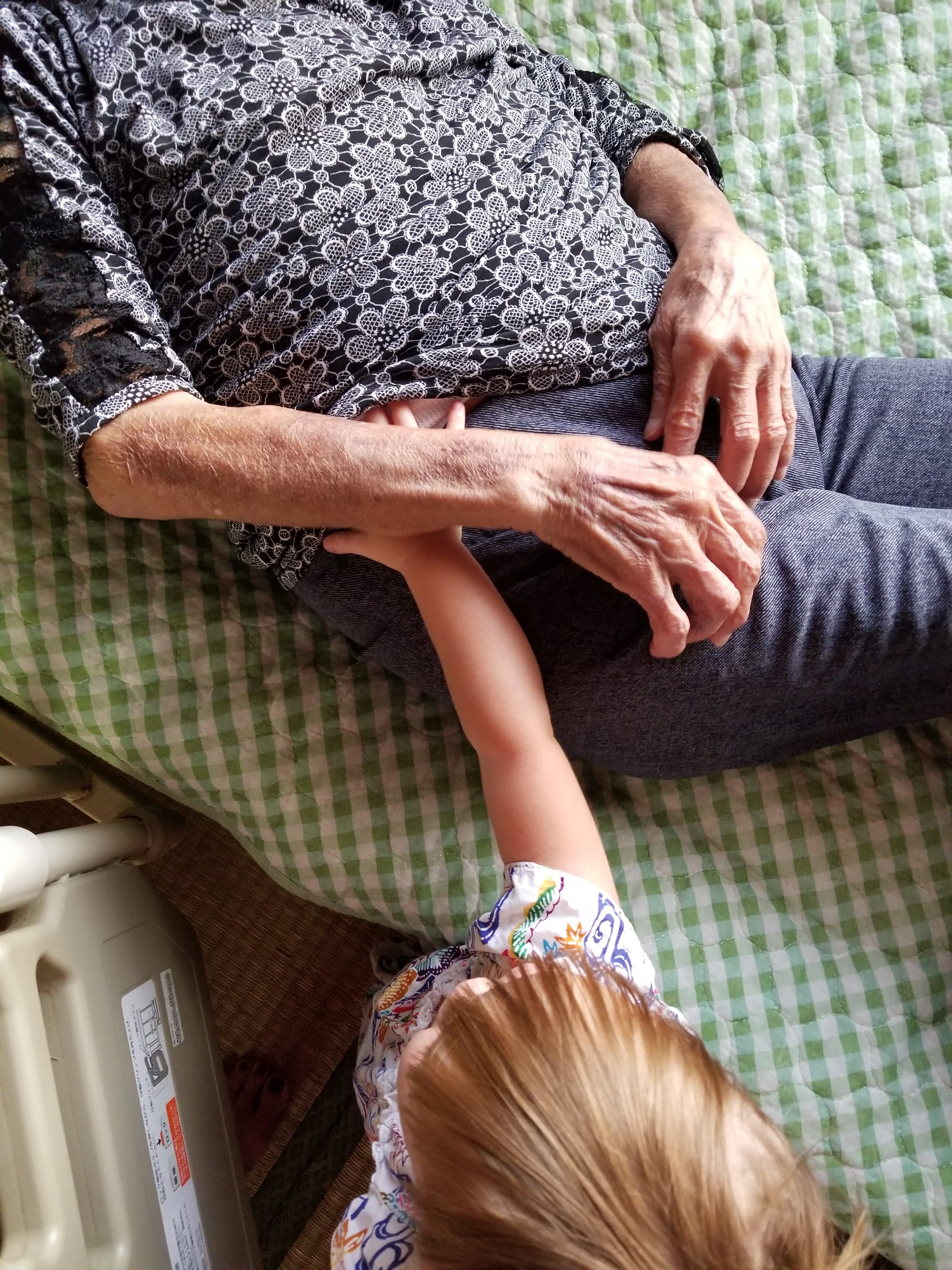I first heard the phrase, “Get comfortable with discomfort” while in a yoga class as I attempted to breathe through pigeon pose and I’ve applied it to everything in my life, from childbirth to confrontation. There are so many painful and unavoidable aspects of our lives that prompt us to look away such as death, sickness, any type of suffering. I’ve never been that type of person, I don’t shy away from “heavy” conversations and I take solace in the perspective that life could be much worse. After years of research and self-study, I think this has a lot to do with my culture and upbringing on Okinawa.

July 2018: My youngest daughter and my Bachan meeting for the first time. (94 years age difference.)
“But fear of death can actually interfere with our enjoyment of life, so it’s worth taking a look at the way Okinawans view death. They become familiar with it, allow it to become part of their daily lives, and view it as just a passage from this world into the next – and that helps them become much less fearful of it.” The Okinawa Program
On Okinawa nearly every home has a butsudan, a shrine dedicated to deceased loved ones and it’s very common to see multiple generations living under one roof. It’s not unusual to have sick or elderly family members cuddling brand new babies, while aunts and uncles share beers with nieces and nephews – in fact, those are some of my favorite memories of home.
As with every family, mine has endured trying times like witnessing my vivacious and spunky Bachan deteriorate as dementia takes over her body and mind. To an outsider it might seem callous or naive that Bachan’s family sits around her eating, drinking, and laughing while she’s incoherently shouting or asleep in her chair but to them I say, “What’s the better alternative? Somber gatherings and a slow mourning? A never-ending funeral for the person that she used to be, before her actual funeral?”
Mind you, the “Pollyannas” that surrounded my Bachan are her adult children, who care for her like an infant – feeding her, toileting her, and comforting her as she hollers throughout the night. I guess you see what you want to see… whether it’s from where I’ve sat on our tatami floors, to how I imagine I’d feel being trapped in an aging body, I think it’s pretty wonderful to be part of the party for as long as you’re alive.
I believe acknowledging that life and health is fleeting gives it the reverence that it deserves, and working with children with multiple and severe disabilities solidified that perspective for me. Of course it was terribly sad to go to work teaching 3-6 year old children who were very sick, not knowing if I was going to lose a student in the classroom but it gave me a certain type of humility and gratitude that I’ll never lose.
I had one boy who my assistants and I were hyper-vigilant about, we kept a constant eye on his pulsox monitor (oxygen and heart rate) while teaching in order to make sure that he stayed alive and well. On several occasions we thought we were going to lose *Billy and I’d see everyone standing around him, announcing his declining vitals while frozen with fear. After a few scares I asked that in the future, we take the necessary steps to alert others while sitting beside him, talking to him, and touching him, because when we die, isn’t that what we want? To know that we’re surrounded by and heading towards love? Regardless of what you believe there’s plenty of ground-breaking scientific evidence that supports spirituality. It’s naive to think that our 5 human senses are all that there is to life… after all, dogs can hear more than we can.
Ignoring difficult scenarios might seem like the easiest way to protect our hearts but I don’t think that’s what they’re meant for. If we can’t feel the breadth and depth of all emotions then that leaves us unable to swim in the deep waters of happiness, gratitude, and fulfillment. You can only run from emotions for so long until they catch up with you – and when that happens I pray that it’s a release, not as a result of disease.
From The Book of Joy, where the Dalai Lama and Archbishop Desmond Tutu (neither strangers to suffering) tackle life’s biggest highs and lows:
If you are in a car accident and your car was totaled, rather than focusing on the loss of your car, you can be grateful that you were not harmed. If you experience a financial crisis, or even bankruptcy, you can see the experience as an opportunity to empathize with others who are going through a similar hardship and to expand your capacity for empathy and compassion. As the archbishop said, there are some aspects of empathy and compassion that can only be discovered through suffering.”
If this post speaks to you, I invite you to participate in the next session of my Okinawa Life Course. You can read more about it HERE.
*Name changed for anonymity